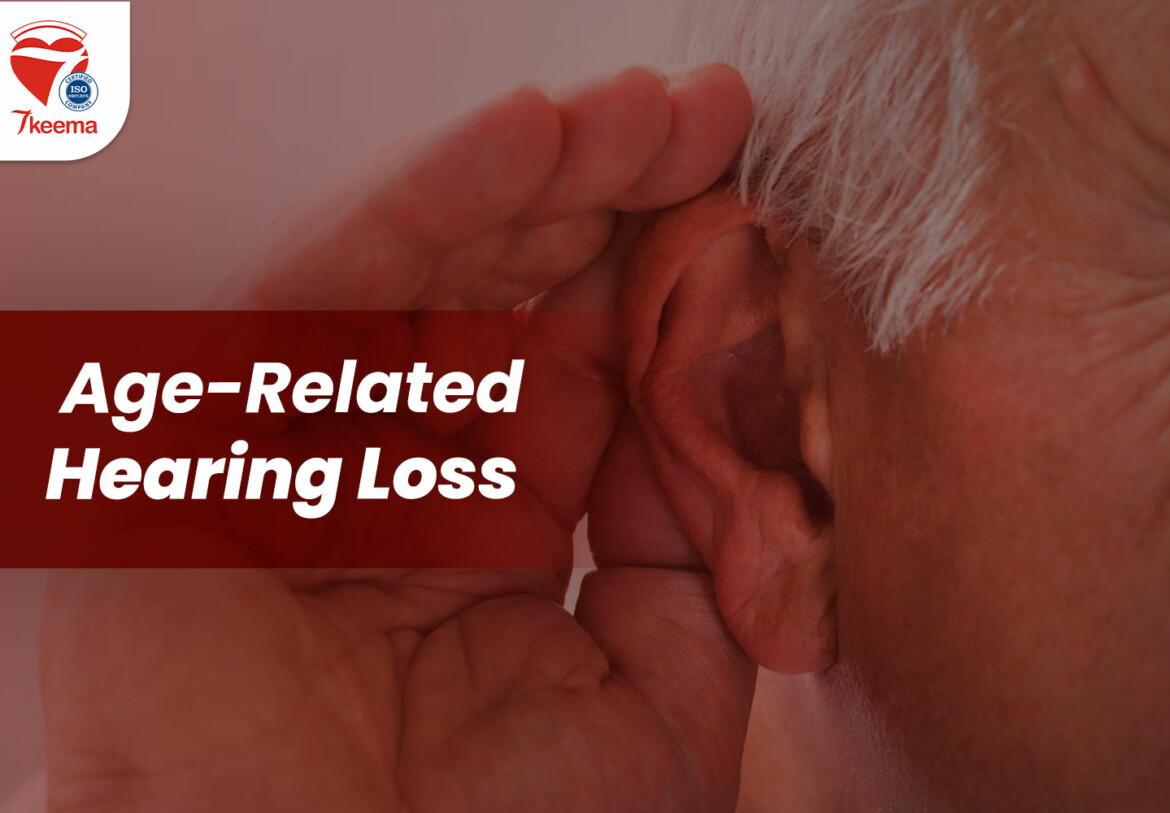You keep raising your voice. Still, your father can’t depict what you’re saying. It could lead to a miscommunication between both of you, leading you to be furious and helpless to reach a way to talk and handle conversations with seniors with age-related sensorineural hearing loss in general.
Hence, it becomes an increasing challenge, knowing that seniors are more likely to have an age-related hearing problem, which is blocking any and every way of social communication that’s mandatory and required throughout this phase.
Therefore, elderly care would consider such a problem while providing specialized care for a senior to reach an efficient way of communication.
Frankly speaking, numbers show us how common age-related hearing loss is among seniors. As per many statistics, one in every three seniors ages between 61 and 70 years old suffers from sensorineural age-related hearing loss. While the risk increases remarkably for seniors over 85, the percentage rises up to 80%.
Another study found that men are more likely to have a sensorineural hearing loss compared to women during the senior stage.
Sensorineural hearing loss doesn’t come instantly. It usually takes many years to lose hearing sensitivity gradually; most probably, it roots back in middle age and keeps developing until reaching the senior stage.
Out of this point, it’s always required to have a periodic hearing checkup to test ears sensitivity and monitor hearing loss along with aging. Starting from the age of 50 and up to 60, which will indicate if it’s getting worse over time and allow them time to deal with such cases and avoid the total hearing loss.

How Do We Hear?
Answering this question could be helpful in understanding what happens to cause the sensorineural hearing loss fully.
Hearing is processed through several biological procedures, where sound waves are transformed into electrical signals, carried then by the auditory nerve to reach the brain and hear the sound as we always do. These procedures go through many narrow passageways, starting from the outer ear.
The hearing procedure goes as follows:
– Sound waves enter from the outer ear and keep moving through a narrow passageway called the ear canal until they reach the eardrum.
– Eardrums start vibrating due to these waves, sending them to three bones that follow in the middle ear, which are called malleus, incus, and stapes.
– These bones transform sound waves from air vibrations to fluid vibrations. This procedure takes place in the cochlea of the inner ear that is filled with fluids. The cochlea is divided into a lower and upper part by an elastic membrane called the basilar membrane, holding many key hearing structures.
– The fluid vibrations lead to a wave forming along the basilar membrane, affecting hair cell-sensory cells laying in that membrane.
– When hair cell-sensory cells go with the wave, stereo cilia that exist on top of these cells bend, which leads to some chemicals being secreted into producing electrical signals.
– Finally, the auditory nerve carries these signals to the brain, making us hear the sound as recognized.
This could be a simplified way to understand how the sound waves could be transformed into what we hear through our ears, which gives us the privilege of depicting what causes age-related sensorineural hearing loss.
Most probably, a senior would face many health conditions and diseases around this age stage, known as geriatric diseases, which could make it necessary to ask for an elderly care service.

Sensorineural Hearing Loss Causes for Seniors
In general, seniors could have a gradual hearing loss. Aging here is the obvious suspect. As we mentioned before, a large segment of seniors is subjected to such risk. So, what could be the cause of sensorineural hearing loss for seniors?
In fact, it could be due to many reasons, among which we can mention the following:
– One of the main reasons for sensorineural hearing loss for seniors is being subjected to loud noise for a long time constantly. A loud noise could destroy hair cell-sensory cells, which transmit the voice into electrical signals and then transport it to the brain. Accordingly, the hearing would start to fade gradually.
– In addition to some chronic diseases that could lower the sensitivity of hearing, such as high blood pressure and diabetes, there is an increased risk due to aging and going into the senior stage. Throughout this stage, seniors would face many problems regarding a normal life, which could require an elderly care service to help them have a higher life standard. On 7keema’s side, elderly care is provided at home and with the highest possible efficiency, during which the care provider makes sure to maintain the sensorineural hearing loss problem if it exists.
– Many drugs and chemicals matters used in many medicines and prescriptions could have destructive side effects on hearing sensitivity.
– Sensorineural hearing loss for seniors could be due to heritage factors transmitted from generation to the following.
– A senior could have a sensorineural hearing loss due to loud noise that causes a malfunction throughout the ear particles and internal organs.
Out of these points, we can depict how seniors are more likely to have a sensorineural hearing loss. Hence, it would be better to know what are the symptoms of such a case and if there are any early symptoms for someone that could indicate a hearing problem with aging.

Age-Related Sensorineural Hearing Loss Symptoms
Many signs could guide us that there’s a hearing problem in progress, leading us to conclude that a lot of the ear sensitivity had been lost.
The main symptoms to be mentioned are as follows:
– Being unable to keep following conversations, it couldn’t sound more than some muttering for a senior that he can’t depict any of its letters clearly.
– Surprisingly, sensorineural hearing loss would make the senior unable to hear high-pitched sounds, such as “S” and “Th.”
– Seniors with sensorineural hearing loss problems would face an enormous difficulty clarifying any direct dialect that had been pushed towards them.
– The funny symptom of the sensorineural hearing loss is that seniors with it would face a huge problem trying to clarify females’ tone of voice.
– On the other side, a senior with sensorineural hearing loss problems would hear some undistinguished voices instantly in a very disturbing way.
– One of the most common symptoms is hearing a constant buzz inside the ear.
What are the 4 levels of hearing loss?
As we mentioned, sensorineural hearing loss comes gradually.
In fact, scientists could be categorized into 4 levels, which start with the “0” stage, at which hearing is sane.
These levels are as follows:
1- Stage 0
This is a basic stage. Normally no hearing problem, which means the human can hear without difficulties and sounds under 25 decibels are clear for him.
2- Stage 1
The first step of losing hearing sensitivity it’s still not a big deal. However, the patient could face difficulty hearing low-frequency sounds. At this stage, the patient can hear sounds ranging between 25 and 40 decibels and can depict words correctly pronounced from a meter distance.
3- Stage 2
It’s getting more progressive, and the hearing power range varies between 41 and 60 decibels. Using hearing aids could be slightly recommended through this phase.
4- Stage 3
This stage is considered a more critical one; it’s where sensorineural hearing loss affects senior life in many ways. The hearing power range varies between 61 and 80 decibels. Being around someone in this stage could require shouting out loud to communicate normally. It’s highly recommended to use hearing aids.
5- Stage 4
It’s the stage where the sensorineural hearing loss gets to its worst case, hearing sensitivity goes to its worst, as hearing power range rise to over 81 decibels. Throughout this stage, hearing aids could not even be effective; it’s better to customize a way to communicate that could suit the senior, such as lips reading technique or sign language. According to this stage of hearing loss, the patient would develop some problems regarding pronouncing as well.

Sensorineural Hearing Loss Diagnosis
In fact, an initial diagnosis could be made by answering several questions with yes or no. Results should indicate having a certain hearing problem. Accordingly, the patient should give a visit to an otolaryngologist to have the best treatment according to his stage and symptoms severity.
As long as seniors are the most likely to have sensorineural hearing loss, it could affect their ability to ask for help and describe what they really need. Out of this point, 7keema has crafted a home elderly care service that considers all that seniors face and their daily life, hearing problems included.
Back to questions, any suspected patient should answer the following questions with yes or no:
– Do you sometimes feel embarrassed when you meet new people because you struggle to hear?
– Do you feel frustrated when talking to members of your family because you have difficulty hearing them?
– Do you have difficulty hearing or understanding co-workers, clients, or customers?
– Do you feel restricted or limited by a hearing problem?
– Do you have difficulty hearing when visiting friends, relatives, or neighbors?
– Do you have trouble hearing in the movies or in the theater?
– Does a hearing problem cause you to argue with family members?
– Do you have trouble hearing the TV or radio at levels that are loud enough for others?
– Do you feel that any difficulty with your hearing limits your personal or social life?
– Do you have trouble hearing family or friends when you are together in a restaurant?
If you got three yes or more, it could be a solid indicator that you are in one of the sensorineural hearing loss stages. A visit to a specialist doctor is highly recommended.
For seniors, it’s highly recommended to provide them with an elderly care provider most of their day time, and elderly care could be helpful throughout such cases.

Avoiding Sensorineural Hearing Loss
To this moment, we don’t have any cure for the sensorineural hearing loss problem, as long as we know it can’t be treated and get back to hearing as normal again.
Therefore, it’s always recommended to avoid the reasons, which could be done through some acts and actions.
– Don’t be subjected to high frequency or high pitch voices for long times. Consider any source of high volume noise or even music through headphones, AirPods, or speakers, as they cause massive damage to the hair cells-sensory cells. As well, avoid using machines that produce such high noise without using ear protection.
– In case it’s needed to be subjected to noise, whether for work or casual use, use ear protection and make it quick.
Sensorineural Hearing Loss Treatment
How do I fix my hearing loss?
Undoubtedly, seniors would have a hard time facing sensorineural hearing loss, but is there any remedy that could be cured? Better yet, is hearing loss reversible?
Unfortunately, the answer to all these previous questions is no.
Despite that, there’re many ways to overcome such obstacles and reach a certain way of good hearing quality, or at least a certain way to connect and communicate.
In these ways, we can mention the following:
– Using hearing aids, which are some electronic devices to be put in or behind the ear that make the sound louder and clearer for the senior who has sensorineural hearing loss.
– Using new technologies to convert pronounced conversations into written lines would help the senior understand what rolls around.
– Head to an audiologist, which helps reach an effective way of connecting, and managing hearing problems, helping the senior read the lips of the speaker, or giving any instructions to overcome the sensorineural hearing loss.
– Don’t neglect ear hygiene and remove extra layers of earwax.
For some reason, surgical intervention could be used for a cochlear implant.

Elderly Care
In fact, elderly care from 7keema gives an integrated service to secure a healthy and safe life for all seniors, regardless of their case or health condition.
The sensorineural hearing loss is also considered, and the service provider makes sure there’s an understandable way of communicating with the senior.




